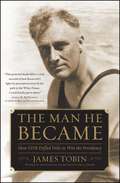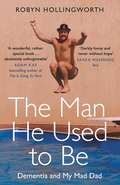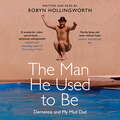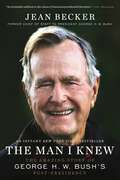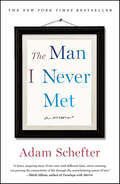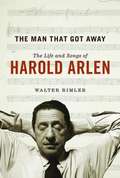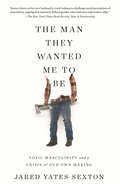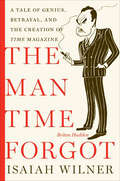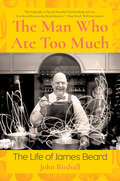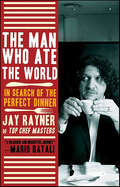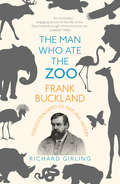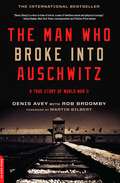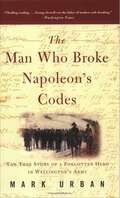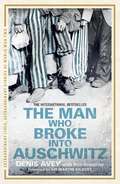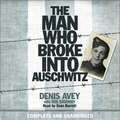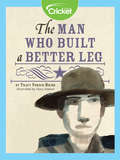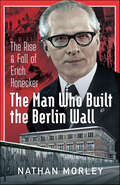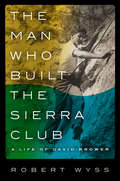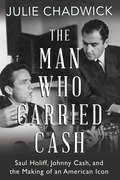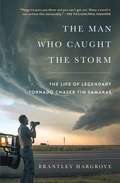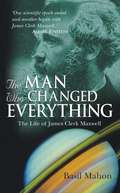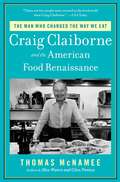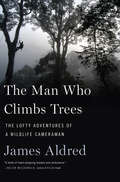- Table View
- List View
The Man He Became
by James TobinWith a searching new analysis of primary sources, NBCC award winner James Tobin reveals how FDR's fight against polio transformed him from a callow aristocrat into the energetic, determined statesman who would rally the nation in the Great Depression and lead it through World War II.When polio paralyzed Franklin Roosevelt at thirty-nine, people wept to think that the young man of golden promise must live out his days as a helpless invalid. He never again walked on his own. But in just over a decade, he had regained his strength and seized the presidency. This was the most remarkable comeback in the history of American politics. And, as author James Tobin shows, it was the pivot of Roosevelt's life--the triumphant struggle that tempered and revealed his true character. With enormous ambition, canny resourcefulness, and sheer grit, FDR willed himself back into contention and turned personal disaster to his political advantage. Tobin's dramatic account of Roosevelt's ordeal and victory offers central insights into the forging of one of our greatest presidents.
The Man He Used To Be: Dementia and My Mad Dad
by Robyn Hollingworth'This is a wonderful, rather special book: funny, warm and loving but also thought-provoking and deeply moving. Absolutely unforgettable - ironically.'ADAM KAY, Sunday Times bestselling author of This Is Going To HurtInadvertent cross-dressing. Attempted murder. Jail break. A waltz at a funeral. A hernia the size of Guernsey.Heartbreaking and darkly comic, these are the moments that litter the messy road from cared-for to carer, a journey that Robyn Hollingworth finds herself on when she's only twenty-five years old. Leaving London to return home to rural South Wales, Robyn finds that it's her old life - same teddy bears resting on her pillow, their bodies tucked under the duvet; same view of the garages behind which she'd had her first cigarette and first kiss - but so much has changed. Her dad, the proud, charmingly intelligent, self-made man who made people laugh, is in the grip of early onset Alzheimer's. His brilliant mind, which saw him building power stations and literally bringing light into the lives of others, has succumbed to darkness. As Robyn settles back in the rhythms of life in the rain-soaked vast Welsh valleys, she keeps a diary charting her journey as the dad she knew disappears before her eyes. Lyrical, poignant and with flashes of brilliant humour, The Man He Used To Be explores how in helping others we can heal ourselves. Previously published in hardback as My Mad Dad.
The Man He Used To Be: Dementia and My Mad Dad
by Robyn Hollingworth'This is a wonderful, rather special book: funny, warm and loving but also thought-provoking and deeply moving. Absolutely unforgettable - ironically.' ADAM KAY, Sunday Times bestselling author of This Is Going To HurtInadvertent cross-dressing. Attempted murder. Jail break. A waltz at a funeral. A hernia the size of Guernsey.Heartbreaking and darkly comic, these are the moments that litter the messy road from cared-for to carer, a journey that Robyn Hollingworth finds herself on when she's only twenty-five years old. Leaving London to return home to rural South Wales, Robyn finds that it's her old life - same teddy bears resting on her pillow, their bodies tucked under the duvet; same view of the garages behind which she'd had her first cigarette and first kiss - but so much has changed. Her dad, the proud, charmingly intelligent, self-made man who made people laugh, is in the grip of early onset Alzheimer's. His brilliant mind, which saw him building power stations and literally bringing light into the lives of others, has succumbed to darkness. As Robyn settles back in the rhythms of life in the rain-soaked vast Welsh valleys, she keeps a diary charting her journey as the dad she knew disappears before her eyes. Lyrical, poignant and with flashes of brilliant humour, The Man He Used To Be explores how in helping others we can heal ourselves. Previously published in hardback as My Mad Dad.
The Man I Knew: The Amazing Story of George H. W. Bush's Post-Presidency
by Jean BeckerA heartfelt portrait of President George H.W. Bush—and his post-presidential life—by the confidante who knew him best. <P><P><b>A New York Times Best Seller</b>
The Man I Never Met: A Memoir
by Adam SchefterA powerful true story of loss and hope by one of the biggest names in sports media, Adam Schefter's The Man I Never Met.On September 11, 2001, Joe Maio went to work in the north tower of the World Trade Center. He never returned, leaving behind a wife, Sharri, and 15-month old son, Devon. Five years later, Sharri remarried, and Devon welcomed a new dad into his life.For thousands, the whole country really, 9/11 is a day of grief. For Adam and Sharri Maio Schefter and their family it’s not just a day of grief, but also hope. This is a story of 9/11, but it’s also the story of 9/12 and all the days after. Life moved on. Pieces were picked up. New dreams were dreamed. The Schefters are the embodiment of that.The Man I Never Met will give voice to all those who have chosen to keep living. It’s gratifying and beautiful. But also messy and hard. Like most families. Except that one day every year history comes roaring back. How do you embrace that? How do you honor that? This book is also a peek at Adam Schefter ("Schefty"), the man behind the headlines and injury reports; a real person who has a real family. It will follow in the path of other ESPN books by Tom Rinaldi and the late Stuart Scott – books that have transcended sport to examine the raw emotion of life.
The Man That Got Away: The Life and Songs of Harold Arlen (Music in American Life)
by Walter RimlerOver the Rainbow, "Stormy Weather," and "One for My Baby" are just a few of Harold Arlen's well-loved compositions. Yet his name is hardly known--except to the musicians who venerate him. At a gathering of songwriters George Gershwin called him "the best of us." Irving Berlin agreed. Paul McCartney sent him a fan letter and became his publisher. Bob Dylan wrote of his fascination with Arlen's "bittersweet, lonely world." A cantor's son, Arlen believed his music was from a place outside himself, a place that also sent tragedy. When his wife became mentally ill and was institutionalized he turned to alcohol. It nearly killed him. But the beautiful songs kept coming: "Blues in the Night," "My Shining Hour," "Come Rain or Come Shine," and "The Man That Got Away." Walter Rimler drew on interviews with friends and associates of Arlen and on newly available archives to write this intimate portrait of a genius whose work is a pillar of the Great American Songbook.
The Man They Wanted Me to Be: Toxic Masculinity and a Crisis of Our Own Making
by Jared Yates SextonBased on the provocative and popular New York Times op–ed, this memoir alternates between the examination of a working–class upbringing and a cultural analysis of the historical, psychological, and sociological sources that make up the roots of toxic masculinity and its impact on society.As progressivism changes American society, and globalism shifts labor away from traditional manufacturing, the roles that have been prescribed to men since the Industrial Revolution have been rendered obsolete. Donald Trump's campaign successfully leveraged male resentment and entitlement, and now, with Trump as president and the rise of the #MeToo movement, it’s clear that our current definitions of masculinity are outdated and even dangerous.Deeply personal and thoroughly researched, the author of The People Are Going to Rise Like the Waters Upon Your Shore has turned his keen eye to our current crisis of masculinity using his upbringing in rural Indiana to examine the personal and societal dangers of the patriarchy. The Man They Wanted Me to Be examines how we teach boys what’s expected of men in America, and the long–term effects of that socialization―which include depression, shorter lives, misogyny, and suicide. Sexton turns his keen eye to the establishment of the racist patriarchal structure which has favored white men, and investigates the personal and societal dangers of such outdated definitions of manhood."By carefully and soberly examining his own story, Sexton deconstructs American life and gives many examples of how pervasive toxic masculinity is in our culture." ―Henry Rollins, Los Angeles Times"This book is critically important to our historical moment . . . Crackles with intensity and absolutely refuses to allow the reader to look away for even a moment from the blight that toxic masculinity in America has wrought." ―Nicholas Cannariato, NPR
The Man Time Forgot: A Tale of Genius, Betrayal, and the Creation of Time Magazine
by Isaiah WilnerAn “illuminating biography” of the forgotten, tragic genius who founded Time magazine with his friend and fierce rival Henry Luce (The New Yorker).Friends, collaborators, and childhood rivals, Briton Hadden and Henry R. Luce were not yet twenty-five when they started Time, the first newsmagazine, at the outset of the Roaring Twenties. By age thirty, they were both millionaires, having laid the foundation for a media empire. But their partnership was explosive and their competition ferocious, fueled by envy as well as love. When Hadden died at the age of thirty-one, Luce began to meticulously bury the legacy of the giant he was never able to best.In this groundbreaking, stylish, and passionate biography, Isaiah Wilner paints a fascinating portrait of Briton Hadden—genius and visionary—and presents the first full account of the birth of Time, while offering a provocative reappraisal of Henry R. Luce, arguably the most significant media figure of the twentieth century.“A riveting narrative . . . richly detailed . . . part This Side of Paradise, part Citizen Kane.” —The Wall Street Journal“[A] scintillating biography . . . a perceptive psychological study and cultural history, with a touch of ink-stained romanticism.” —Publishers Weekly“With access to the Time archives and unpublished interviews and correspondence, Wilner offers all the excitement of a new media enterprise launched in the Roaring Twenties by two fascinating figures.” —Booklist
The Man Who Ate Too Much: The Life Of James Beard
by John BirdsallThe definitive biography of America’s best-known and least-understood food personality, and the modern culinary landscape he shaped. In the first portrait of James Beard in twenty-five years, John Birdsall accomplishes what no prior telling of Beard’s life and work has done: He looks beyond the public image of the "Dean of American Cookery" to give voice to the gourmet’s complex, queer life and, in the process, illuminates the history of American food in the twentieth century. At a time when stuffy French restaurants and soulless Continental cuisine prevailed, Beard invented something strange and new: the notion of an American cuisine. Informed by previously overlooked correspondence, years of archival research, and a close reading of everything Beard wrote, this majestic biography traces the emergence of personality in American food while reckoning with the outwardly gregarious Beard’s own need for love and connection, arguing that Beard turned an unapologetic pursuit of pleasure into a new model for food authors and experts. Born in Portland, Oregon, in 1903, Beard would journey from the pristine Pacific Coast to New York’s Greenwich Village by way of gay undergrounds in London and Paris of the 1920s. The failed actor–turned–Manhattan canapé hawker–turned–author and cooking teacher was the jovial bachelor uncle presiding over America’s kitchens for nearly four decades. In the 1940s he hosted one of the first television cooking shows, and by flouting the rules of publishing would end up crafting some of the most expressive cookbooks of the twentieth century, with recipes and stories that laid the groundwork for how we cook and eat today. In stirring, novelistic detail, The Man Who Ate Too Much brings to life a towering figure, a man who still represents the best in eating and yet has never been fully understood—until now. This is biography of the highest order, a book about the rise of America’s food written by the celebrated writer who fills in Beard’s life with the color and meaning earlier generations were afraid to examine.
The Man Who Ate the World: In Search of the Perfect Dinner
by Jay RaynerAn astronomical gastronomical undertaking —one of the world's preeminent restaurant critics takes on the giants of haute cuisine, one tasting menu at a timeLike the luxury fashion companies Gucci and Chanel, high-end dining has gone global, and Jay Rayner has watched, amazed, as the great names of the restaurant business have turned themselves from artisans into international brands.Long suspecting that his job was too good to be true, Rayner uses his entrée into this world to probe the larger issues behind the globalization of dinner. Combining memoir with vivid scenes at the table; interviews with the world's most renowned chefs, restaurateurs, and eaters; and a few well-placed rants and raves about life as a paid gourmand, Rayner puts his thoughtful, innovative, and hilarious stamp on food writing. He reports on high-end gastronomy from Vegas to Dubai, Moscow to Tokyo, London to New York, ending in Paris where he attempts to do with Michelin-starred restaurants what Morgan Spurlock did with McDonald's in Super Size Me—eating at those establishments on consecutive days and never refusing a sixteen-course tasting menu when it's offered.The Man Who Ate the World is a fascinating and riotous look at the business and pleasure of fine dining.
The Man Who Ate the Zoo: Frank Buckland, forgotten hero of natural history
by Richard GirlingFrank Buckland was an extraordinary man – surgeon, natural historian, popular lecturer, bestselling writer, museum curator, and a conservationist before the concept even existed. Eccentric, revolutionary, prolific, he was one of the nineteenth century’s most improbable geniuses. His lifelong passion was to discover new ways to feed the hungry. Rhinoceros, crocodile, puppy-dog, giraffe, kangaroo, bear and panther all had their chance to impress, but what finally - and, eventually, fatally - obsessed him was fish. Forgotten now, he was one of the most original, far-sighted and influential natural scientists of his time, held as high in public esteem as his great philosophical enemy, Charles Darwin.
The Man Who Broke Into Auschwitz: A True Story of World War II
by Denis Avey Rob BroombyThe Man Who Broke into Auschwitz is the extraordinary true story of a British soldier who marched willingly into the concentration camp, Buna-Monowitz, known as Auschwitz III. In the summer of 1944, Denis Avey was being held in a British POW labour camp, E715, near Auschwitz III. He had heard of the brutality meted out to the prisoners there and he was determined to witness what he could. He hatched a plan to swap places with a Jewish inmate and smuggled himself into his sector of the camp. He spent the night there on two occasions and experienced at first-hand the cruelty of a place where slave workers, had been sentenced to death through labor. Astonishingly, he survived to witness the aftermath of the Death March where thousands of prisoners were murdered by the Nazis as the Soviet Army advanced. After his own long trek right across central Europe he was repatriated to Britain. For decades he couldn't bring himself to revisit the past that haunted his dreams, but now Denis Avey feels able to tell the full story--a tale as gripping as it is moving--which offers us a unique insight into the mind of an ordinary man whose moral and physical courage are almost beyond belief.
The Man Who Broke Napoleon's Codes: The True Story of a Forgotten Hero in Wellington's Army
by Mark UrbanThe little-known story of a brilliant British code-cracker: &“[Urban] has pieced together the fragments and deciphered the truth about a hidden hero.&” —Daily Telegraph The Duke of Wellington—who began his military career as Arthur Wellesley—is rightly credited for the strategic and intelligence-gathering brilliance that culminated in Britain&’s defeat of Napoleon at Waterloo. Two centuries later, many of his subordinates are still remembered for their roles in these historic campaigns. But Lt. Col. George Scovell is not among them. This is the story of a man of common birth—bound, according to the severe social strictures of eighteenth-century England, for the life of a tradesman—who would become his era&’s most brilliant code-breaker and an officer in Wellesley&’s army. In an age when officers were drawn almost exclusively from the ranks of the nobility, George Scovell—an engraver&’s apprentice—joined Wellesley in 1809. Scovell provides a fascinating lens through which to view a critical era in military history—his treacherous rise through the ranks despite the scorn of his social betters, and his presence alongside Wellesley in each of the major European campaigns from the Iberian Peninsula through Waterloo. But Scovell was more than just a participant in those events. Already recognized as a gifted linguist, Scovell would prove a remarkably nimble cryptographer. Encoded communiqués between Napoleon and his generals, intercepted by the British, were brought to Scovell for his skilled deciphering. As Napoleon&’s encryption techniques became more sophisticated, Wellesley came to rely ever more on Scovell&’s genius for this critical intelligence. In Scovell&’s lifetime, his role in Britain&’s greatest military victory was grudgingly acknowledged, but his accomplishments would eventually be credited to others—including Wellington himself. His name—and contributions—have been largely overlooked.The Man Who Broke Napoleon&’s Codes tells the fascinating story of the early days of cryptology, re-creates the high drama of some of Europe&’s most remarkable military campaigns, and restores the mantle of hero to a man heretofore forgotten by history. &“Combine[s] the fast-paced narrative of a spy novel with colorful period detail describing the inner workings of an army staff at war.&” —Library Journal &“Thrilling reading.&” —The Washington Times
The Man Who Broke into Auschwitz: The Extraordinary True Story (Extraordinary Lives, Ext Ser.)
by Denis Avey Rob BroombyTHE INTERNATIONAL BESTSELLERTHE MAN WHO BROKE INTO AUSCHWITZ is the extraordinary true story of a British soldier who marched willingly into Buna-Monowitz, the concentration camp known as Auschwitz III.In the summer of 1944, Denis Avey was being held in a POW labour camp, E715, near Auschwitz III. He had heard of the brutality meted out to the prisoners there and he was determined to witness what he could. He hatched a plan to swap places with a Jewish inmate and smuggled himself into his sector of the camp. He spent the night there on two occasions and experienced at first-hand the cruelty of a place where slave workers, had been sentenced to death through labour. Astonishingly, he survived to witness the aftermath of the Death March where thousands of prisoners were murdered by the Nazis as the Soviet Army advanced. After his own long trek right across central Europe he was repatriated to Britain. For decades he couldn't bring himself to revisit the past, but now Denis Avey feels able to tell the full story - a tale as gripping as it is moving - which offers us a unique insight into the mind of an ordinary man whose moral and physical courage are almost beyond belief.
The Man Who Broke into Auschwitz: The Extraordinary True Story (Extraordinary Lives, Extraordinary Stories of World War Two #8)
by Denis Avey Rob BroombyTHE INTERNATIONAL BESTSELLERTHE MAN WHO BROKE INTO AUSCHWITZ is the extraordinary true story of a British soldier who marched willingly into Buna-Monowitz, the concentration camp known as Auschwitz III.In the summer of 1944, Denis Avey was being held in a POW labour camp, E715, near Auschwitz III. He had heard of the brutality meted out to the prisoners there and he was determined to witness what he could. He hatched a plan to swap places with a Jewish inmate and smuggled himself into his sector of the camp. He spent the night there on two occasions and experienced at first-hand the cruelty of a place where slave workers, had been sentenced to death through labour. Astonishingly, he survived to witness the aftermath of the Death March where thousands of prisoners were murdered by the Nazis as the Soviet Army advanced. After his own long trek right across central Europe he was repatriated to Britain. For decades he couldn't bring himself to revisit the past, but now Denis Avey feels able to tell the full story - a tale as gripping as it is moving - which offers us a unique insight into the mind of an ordinary man whose moral and physical courage are almost beyond belief.
The Man Who Broke into Auschwitz: The Extraordinary True Story (Extraordinary Lives, Extraordinary Stories of World War Two #8)
by Denis Avey Rob BroombyTHE MAN WHO BROKE INTO AUSCHWITZ is the extraordinary true story of a British soldier who marched willingly into Buna-Monowitz, the concentration camp known as Auschwitz III.In the summer of 1944, Denis Avey was being held in a POW labour camp, E715, near Auschwitz III. He had heard of the brutality meted out to the prisoners there and he was determined to witness what he could. He hatched a plan to swap places with a Jewish inmate and smuggled himself into his sector of the camp. He spent the night there on two occasions and experienced at first-hand the cruelty of a place where slave workers, had been sentenced to death through labour. Astonishingly, he survived to witness the aftermath of the Death March where thousands of prisoners were murdered by the Nazis as the Soviet Army advanced. After his own long trek right across central Europe he was repatriated to Britain. For decades he couldn't bring himself to revisit the past that haunted his dreams, but now Denis Avey feels able to tell the full story - a tale as gripping as it is moving - which offers us a unique insight into the mind of an ordinary man whose moral and physical courage are almost beyond belief. (P)2011 Hodder & Stoughton
The Man Who Built a Better Leg
by Tracy Vonder BrinkInjured by a cannonball, James Edward Hanger was the first amputee of the Civil War. Determined to find a better solution than a peg leg, he worked to develop his own artificial limb company. He even continued working past retirement, providing Hanger Limbs for victims of World War I.
The Man Who Built the Berlin Wall: The Rise & Fall of Erich Honecker
by Nathan MorleyThe first ever English language biography of Erich Honecker, covering his entire life and career. In The Man Who Built the Berlin Wall, Nathan Morley brings to life the story of the longtime leader of the German Democratic Republic. Drawing from a wealth of untapped archival sources – and firsthand interviews with Honecker’s lawyers, journalists, and contemporary witnesses – Morley paints a vivid portrait of how an uneducated miner’s son from the Saarland rose to the highest ranks of the German Communist Party. Having survived a decade of brutality in Nazi prisons, Honecker emerged as an ambitious political player and became the shadowy mastermind behind the construction of the Berlin Wall in 1961, a crucial moment in twentieth-century history. Although frequently on the verge of being relegated to obscurity, he managed to overthrow strongman Walter Ulbricht at the height of the Cold War and reigned supreme over the GDR between 1971-1989. However, by 1980, the Honecker honeymoon was on the wane as a decade of economic and social difficulties blighted the GDR. Then, as tumultuous changes swept through the Soviet bloc, everything in and around him collapsed in 1989. His health, his certainties, his ideology, his apparatus of power, and his beloved SED party. Terminally ill, he was literally kidnapped from Russia to answer for his crimes in a Berlin court. A controversial figure, Honecker’s notorious philandering, his difficult relationship with his wife Margot, penchant for porn, addiction to hunting, and gilded lifestyle at a forest settlement north of Berlin are all brought into sharp focus. Although haunted by the fall of the Berlin Wall, Erich Honecker died in 1994, still believing the GDR was the envy of the world.
The Man Who Built the Sierra Club: A Life of David Brower
by Robert WyssDavid Brower (1912–2000) was a central figure in the modern environmental movement. His leadership, vision, and elegant conception of the wilderness forever changed how we approach nature. In many ways, he was a twentieth-century Thoreau. Brower transformed the Sierra Club into a national force that challenged and stopped federally sponsored projects that would have dammed the Grand Canyon and destroyed hundreds of millions of acres of our nation's wilderness. To admirers, he was tireless, passionate, visionary, and unyielding. To opponents and even some supporters, he was contentious and polarizing.As a young man growing up in Berkeley, California, Brower proved himself a fearless climber of the Sierra Nevada's dangerous peaks. After serving in the Tenth Mountain Division during World War II, he became executive director of the Sierra Club. This uncompromising biography explores Brower's role as steward of the modern environmental movement. His passionate advocacy destroyed lifelong friendships and, at times, threatened his goals. Yet his achievements remain some of the most important triumphs of the conservation movement. What emerges from this unique portrait is a rich and robust profile of a leader who took up the work of John Muir and, along with Rachel Carson, made environmentalism the cause of our time.
The Man Who Carried Cash: Saul Holiff, Johnny Cash, and the Making of an American Icon
by Julie ChadwickThe unlikely, rocky relationship between an American country superstar and his straightlaced Canadian manager. Before there was Johnny and June, there was Johnny and Saul. The Man Who Carried Cash chronicles a relationship that was both volatile and affectionate between Johnny Cash and his manager, Saul Holiff. From roadside taverns to the roaring crowds at Madison Square Garden, from wrecked cars and jail cells all the way to the White House, the story of Johnny and Saul is a portrait of two men from different worlds who were more alike than either cared to admit. Saul handled the bookings and the no-shows, the divorce and the record deals, drugs, overdoses, and arrests. He was there for the absolute worst of times, but also for the best: Carnegie Hall, Folsom Prison, “A Boy Named Sue,” and Cash’s hit television series. But in 1973, at the zenith of Cash’s career, Saul quit. Until now, no one knew why.
The Man Who Caught the Storm: The Life of Legendary Tornado Chaser Tim Samaras
by Brantley Hargrove“An instant classic of Americana—a story of tragedy, invention, lore, science, and a most original kind of genius.” —Hampton Sides “Masterful. This is what man versus nature is all about.” —Skip Hollandsworth The Man Who Caught the Storm is the saga of the greatest tornado chaser who ever lived: a tale of obsession and daring, and an extraordinary account of humanity’s high-stakes race to understand nature’s fiercest phenomenon.At the turn of the twenty-first century, the tornado was one of the last true mysteries of the modern world. It was a monster that ravaged the American heartland a thousand times each year, yet science’s every effort to divine its inner workings had ended in failure. Researchers all but gave up, until the arrival of an outsider. In a field of PhDs, Tim Samaras didn’t attend a day of college in his life. He chased storms with brilliant tools of his own invention and pushed closer to the tornado than anyone else ever dared. When he achieved what meteorologists had deemed impossible, it was as if he had snatched the fire of the gods. Yet even as he transformed the field, Samaras kept on pushing. As his ambitions grew, so did the risks. And when he finally met his match—in a faceoff against the largest tornado ever recorded—it upended everything he thought he knew. Brantley Hargrove delivers a masterful tale, chronicling the life of Tim Samaras in all its triumph and tragedy. He takes readers inside the thrill of the chase, the captivating science of tornadoes, and the remarkable character of a man who walked the line between life and death in pursuit of knowledge. Following the tradition of Into Thin Air and The Perfect Storm, Hargrove’s debut offers an unforgettable exploration of obsession and the extremes of the natural world.
The Man Who Changed Everything
by Basil MahonThis is the first biography in twenty years of James Clerk Maxwell, one of the greatest scientists of our time and yet a man relatively unknown to the wider public. Approaching science with a freshness unbound by convention or previous expectations, he produced some of the most original scientific thinking of the nineteenth century -- and his discoveries went on to shape the twentieth century.
The Man Who Changed the Way We Eat
by Thomas McnameeIn the 1950s, America was a land of overdone roast beef and canned green beans--a gastronomic wasteland. Most restaurants relied on frozen, second-rate ingredients and served bogus "Continental" cuisine. Authentic French, Italian, and Chinese foods were virtually unknown. There was no such thing as food criticism at the time, and no such thing as a restaurant critic. Cooking at home wasn't thought of as a source of pleasure. Guests didn't chat around the kitchen. Professional equipment and cookware were used only in restaurants. One man changed all that. From the bestselling author of Alice Waters and Chez Panisse comes the first biography of the passionate gastronome and troubled genius who became the most powerful force in the history of American food--the founding father of the American food revolution. From his first day in 1957 as the food editor of the New York Times, Craig Claiborne was going to take his readers where they had never been before. Claiborne extolled the pleasures of exotic cuisines from all around the world, and with his inspiration, restaurants of every ethnicity blossomed. So many things we take for granted now were introduced to us by Craig Claiborne--crÈme fraÎche, arugula, balsamic vinegar, the Cuisinart, chef's knives, even the salad spinner. He would give Julia Child her first major book review. He brought Paul Bocuse, the Troisgros brothers, Paul Prudhomme, and Jacques PÉpin to national acclaim. His $4,000 dinner for two in Paris was a front-page story in the Times and scandalized the world. And while he defended the true French nouvelle cuisine against bastardization, he also reveled in a well-made stew or a good hot dog. He made home cooks into stars--Marcella Hazan, Madhur Jaffrey, Diana Kennedy, and many others. And Craig Claiborne made dinner an event--whether dining out, delighting your friends, or simply cooking for your family. His own dinner parties were legendary. Craig Claiborne was the perfect Mississippi gentleman, but his inner life was one of conflict and self-doubt. Constrained by his position to mask his sexuality, he was imprisoned in solitude, never able to find a stable and lasting love. Through Thomas McNamee's painstaking research and eloquent storytelling, The Man Who Changed the Way We Eat unfolds a history that is largely unknown and also tells the full, deep story of a great man who until now has never been truly known at all.
The Man Who Climbs Trees: The Lofty Adventures of a Wildlife Cameraman
by James Aldred&“A vertiginous, white-knuckled adventure through some of the most spectacular forests in the world.&” ?—Washington Post Meet the man who climbs trees for a living.? In this adventure memoir, Aldred carries us with him across the globe and up to the top of these towering forest titans as he recalls his most memorable encounters with trees and their inhabitants.? Every child knows the allure of climbing trees. But how many of us get to make a living at it, spending days observing nature from the canopies of stunning forests all around the world? As a wildlife cameraman for the BBC and National Geographic, James Aldred spends his working life high up in trees, poised to capture key moments in the lives of wild animals and birds. Aldred&’s climbs take him to the most incredible and majestic trees in existence. In Borneo, home to the tallest tropical rain forest on the planet, just getting a rope up into the 250-foot-tall trees is a challenge. In Venezuela, even body armor isn&’t guaranteed protection against the razor-sharp talons of a nesting Harpy Eagle. In Australia, the peace of being lulled to sleep in a hammock twenty-five stories above the ground— after a grueling day of climbing and filming—is broken by a midnight storm that threatens to topple the tree. In this vivid account of memorable trees he has climbed (&“Goliath,&” &“Apollo,&” &“Roaring Meg&”), Aldred blends incredible stories of his adventures in the branches with a fascination for the majesty of trees to show us the joy of rising—literally—above the daily grind, up into the canopy of the forest.

